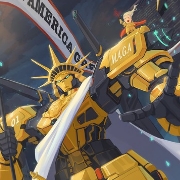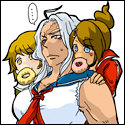|
thetruegentleman posted:Sounds like some more unique aliens might do the trick: maybe some that give bonuses to production or strength if you own them, but do the opposite if they're hostile instead? Sounds like messing with the alien's code is a bad idea, which is a big shame to hear. One of the things that appealed to me was the idea of having a more interesting neutral faction than Barbarians from the previous games
|
|
|
|

|
| # ? Apr 25, 2024 09:46 |
|
Yeah, it seems like the aliens are functionally barbarian units, left with less and less roaming terrain and falling further and further behind the power curve. I imagine there isn't anything like the lifecycle bonus from SMAC to serve as a catch-up mechanism, either?
|
|
|
|
Harmony gets to incorporate aliens into their units, both as xeno-cavalry and designer lifeforms. But the "wild" aliens don't get to do much except suck and die in late game. I bet you could try to mod in "elder" versions of the aliens with better stats that show up late. It wouldn't do much more than extend their nuisance factor with bigger numbers, but it'd be something. That said: early game can be terrifying if you are an aquatic-embark civilization and a kraken starts hanging around your capital. You hold your breath and hope it doesn't juke into a tile improvement, or eat the convoy you spent several turns building, or start taking swipes at the city itself.
|
|
|
|
Snollygoster posted:That said: early game can be terrifying if you are an aquatic-embark civilization and a kraken starts hanging around your capital. You hold your breath and hope it doesn't juke into a tile improvement, or eat the convoy you spent several turns building, or start taking swipes at the city itself. I've seen this happen. In a past game, I started near one of the aquatic factions, and less than twenty turns after they landed, I got a notice that they'd lost their capital. I explored around and saw that they'd built a land city that had the capital marker on it... and a big field of razed tile improvements out in the middle of the water.
|
|
|
|
Cythereal posted:I've seen this happen. In a past game, I started near one of the aquatic factions, and less than twenty turns after they landed, I got a notice that they'd lost their capital. I explored around and saw that they'd built a land city that had the capital marker on it... and a big field of razed tile improvements out in the middle of the water. Note to self: water is terrifying. And as a heads up for those interested in buying the DLC, Rising Tide is 25% off until the 12th ousire fucked around with this message at 01:08 on Feb 9, 2016 |
|
|
|
Snollygoster posted:Harmony gets to incorporate aliens into their units, both as xeno-cavalry and designer lifeforms. But the "wild" aliens don't get to do much except suck and die in late game. I bet you could try to mod in "elder" versions of the aliens with better stats that show up late. It wouldn't do much more than extend their nuisance factor with bigger numbers, but it'd be something. Yeah, modding the alien stats to make tougher late game versions has been done, and extending the annoyance is pretty much all that happens, unless you play Harmony, in which case it helps balance the late game a little. They must have re-used the barbarian AI and bolted on some spaghetti code that altered their aggression to make them slightly less random; in fact, they probably have bolted spaghetti code everywhere.
|
|
|
|
Part 7: Thinking Outside The Box Historians and xenobiologists would later debate whether or not Makara would have smashed the first ARC settlement. If left unchecked, some argued, maybe the creature would have slipped back into the ocean or wandered farther inland. Others pointed out Makara’s giant claws. Makara was an apex predator, too dangerous to live. 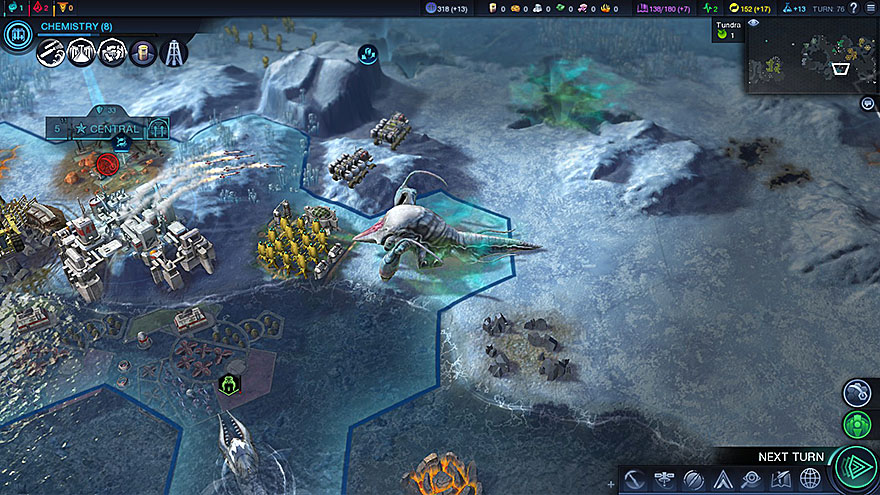 ARC’s security feeds captured Makara’s emergence from the sea, its lumbering, swaying steps from the cold ocean onto land. ARC’s security feeds captured Central’s furious response. 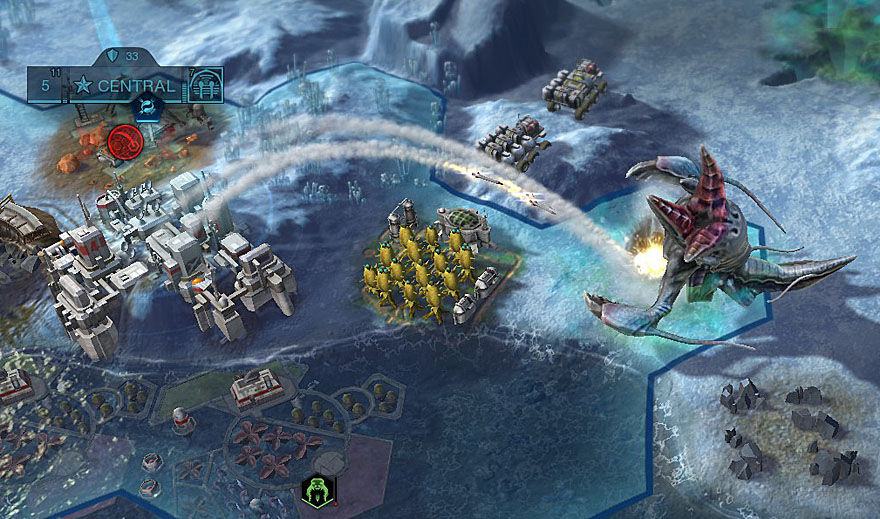 Most of the time, cities can take shots at anything in a two-hex range. My purity affinity bonus gave me just enough of an edge to kill the alien before it could do harm. Makara is twice as strong as my Marines, and it wrecks tile improvements. It might not have destroyed my capital but it could have set me back several turns depending on what it destroyed. ARC had carried munitions 12 light years and hundreds of years across space to fire them into alien life. When the apex predator collapsed from its injuries, Central cheered. By slaying Makara, they had expressed their undeniable will to survive. --- Months passed. Makara had long since been carved into souvenirs and specimens for ARC’s scientific community. Axiom scientific outpost had grown into a small settlement. Dr. Prickett was sailing back from Polystralia and wanted to see how it had progressed. Stone wool insulation from Central’s basalt quarries made the habs a little more bearable. 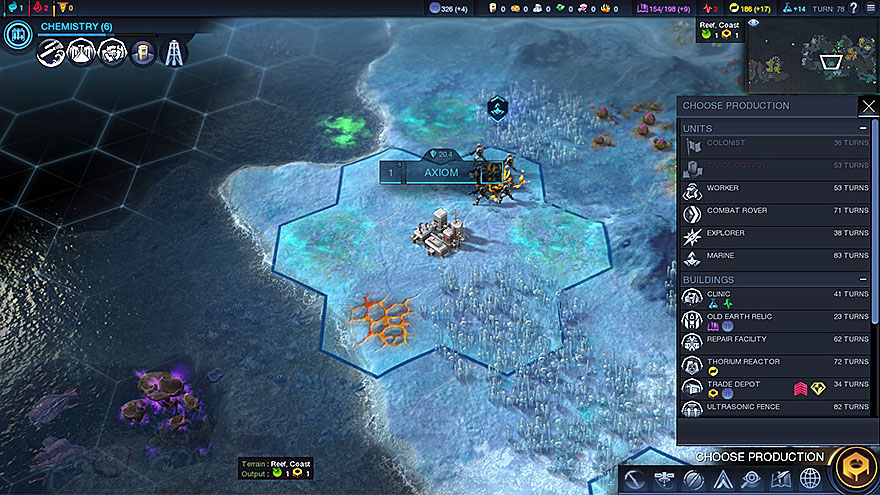 See the red number in the upper right? That’s our Health, and it should be green and a positive number. It’s at -3 right now. Health limits your expansion - the greater your population, the more your Health drops. If you’ve played Civ V, this is the Happiness mechanic with a fresh coat of paint. However, the penalties for negative Health are not terrible, at least until you start getting into double-digit penalties. Unlike Civ V, you don’t eat combat penalties if Health drops to -10 or lower. In Rising Tide, as of the current patch, you can safely ignore negative Health to an extent. You’ll have to in order to keep pace with the AI opponents. Rising Tide gives you several new avenues, through Diplomacy, to counter negative Health, and most of the Virtue trees have unlocks that give you so much Health that it trivializes the mechanic in the late game. But that’s for later. CEO Suzanne Fielding noticed an uptick in sick days taken. The scientists in Axiom took air quality samples and gauged the parts per million of miasma to clean air. The results puzzled them. There were entire regions of Old Earth where the air was no longer breathable. Tau Ceti’s atmosphere was, if not cleaner, then at least unspoiled by industry and war. She brought it up at one of her briefings with Phan Phuong, but didn’t dwell on it for long. The CEO had geopolitics on her mind. “What do you think?” Fielding said, looking up from a displayed map to Phan. 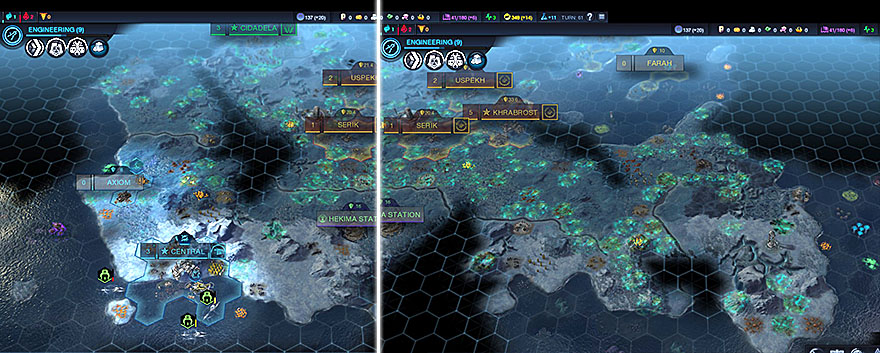 This is our continent. To the west, off-map: Franco-Iberia, across an ocean. To the east, off-map: Polystralia and the Kavithan Protectorate, sharing a continent but with plenty of room for each to grow. “I think…” Phan paused, considered her words. “Our neighbors are thriving.” “Better than ARC, you mean,” Fielding said. “Yes.” “We spared no expense,” Fielding said. She sounded annoyed. “With respect, it’s miraculous we’re here at all. We made assumptions about what life would be like here and packed the seedship accordingly. Some of those assumptions turned out to be correct. After Makara, I’m glad we packed weapons.” “That’s true. But… we can’t eat rockets.” She frowned. “We’re playing catch-up to our neighbors with fundamentals like agriculture. Look how much Kozlov’s spread already.” “Ms. Fielding,” Phan said. “Is this a contest?” Fielding arched an eyebrow. “The American Reclamation Corporation led Old Earth in environmental mitigation, retail and entertainment. As far as I’m aware, we are the only non-state actor with the resources to undertake the Seeding. I will not be satisfied if, after all this effort and sacrifice, we end up as a backwater outpost.” Phan nodded. They needed more territory. But expanding meant planting flags closer to the industrial powerhouse of the Slavic Federation, or at the doorstep of Old Earth’s greatest soldier and his army. She told Fielding as much. “We’ll circle back on this,” Fielding said. “We can’t deal with Brasilia or the SF from a position of military strength, but I won’t be boxed into irrelevance.” Phan nodded, trying not to glance at the Howard Miller longcase clock in Fielding’s office. She heard it kept Central Standard Time back on Old Earth, though she couldn’t imagine how. She had to pick up Tin from career shadowing after this meeting. “I’ve noticed a lot of priority communication coming from Khrabrost,” Phan said. Fielding rolled her eyes and tapped on her computer’s keyboard, showing Phan a glimpse of their communiques. “Vadim Kozlov never seems to sleep. I think he’s trying to pay us compliments.”   In Rising Tide, your neighbors will tell you exactly what they think of you. The diplomatic traits other civilizations purchase govern how you can raise or lower respect with you. Kozlov respects more orbital units in the sky and high rates of energy production. Since we’re getting a good boost from the Solar Collector we picked up, he’s been happy with us. Phan smiled. “And what do you make of the others?” Fielding considered. “We need to know more about Franco-Iberia,” she said. “How they perform will come down to finding out who they share a continent with. Otherwise, if Élodie wants to teach the western canon to wolf beetles? She’s welcome to it.” “Mm-hm.” Phan made some mental notes. “Hutama has been playing nice with us,” she said. “No deals with Polystralia,” Fielding said. “They’re doing fine without us.” They spent a good deal of time talking about trade, specifically with Hekima Station to the east. A few ARC and Brasilian agricultural scientists had set up shop, growing livestock from embryonic material. They were happy to trade meat and leather for supplies. 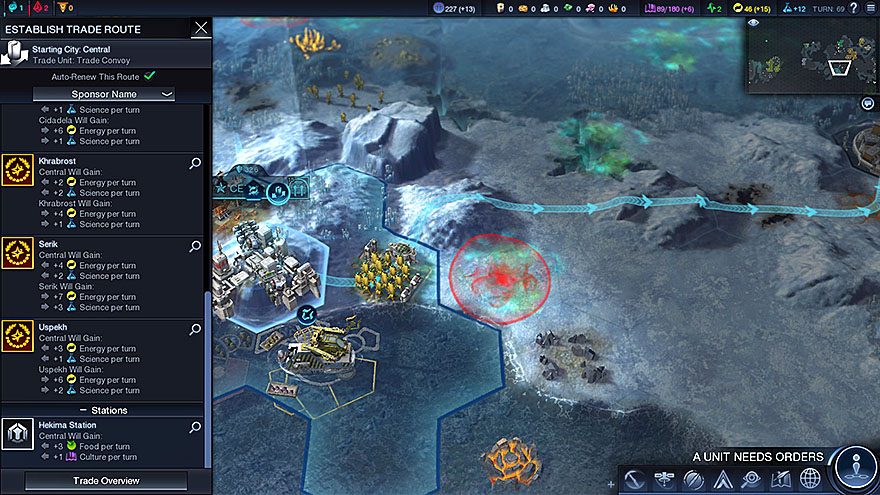 If you played Beyond Earth at release, you know trade was a mess: routes had to be renewed manually. If you played Rising Tide at release, you know domestic trade was vastly better than any other choice you could make. The most recent patch tamped down on domestic trade yields, but they’re still a good choice. We can trade with the Slavic Federation, but as you can see, they would get more out of the deal than we would. Hekima Station will boost Central’s growth with food, and over time the station will level up and give us more food and culture. --- Phan was saying her goodbyes when Fielding’s computer chirped an incoming message. Fielding held up a finger and Phan gritted her teeth -- by now, the doctors must be tired of answering a little boy’s questions while they ran blood work and treated coughs. Then Fielding laughed. Phan had never heard Suzanne Fielding let out anything more boisterous than a diplomatic chuckle during broadcast interviews. “Phuong, please come here. I really think you’ll like this.” Phan crossed over to Fielding’s computer. The CEO grinned. “Our explorers found Franco-Iberia’s neighbor to their north.” 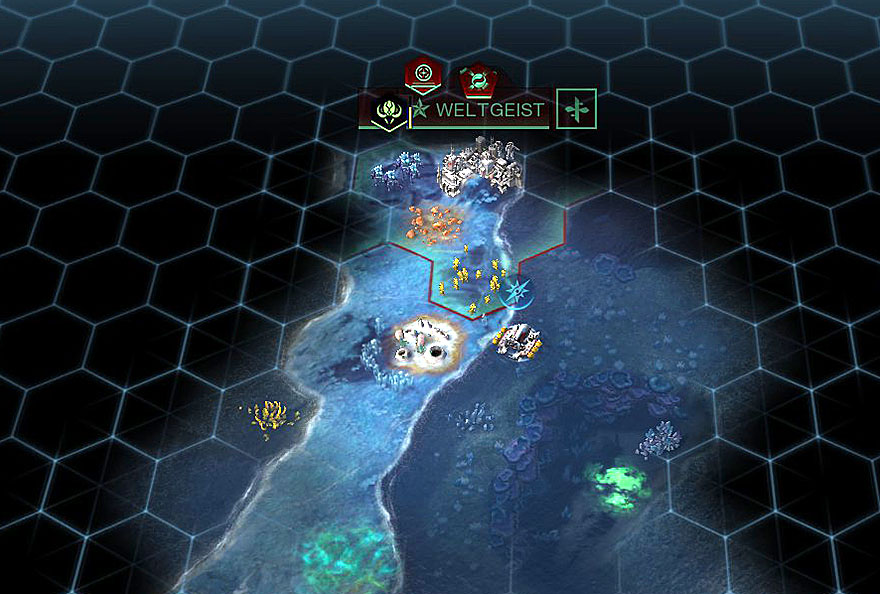 Phan read the transcript. “Willkommen in Weltgeist,” she said. She covered her mouth with her hands. “You can’t be serious.” Fielding laughed again. “Élodie came all this way, and Lena Ebner is her next-door neighbor.” 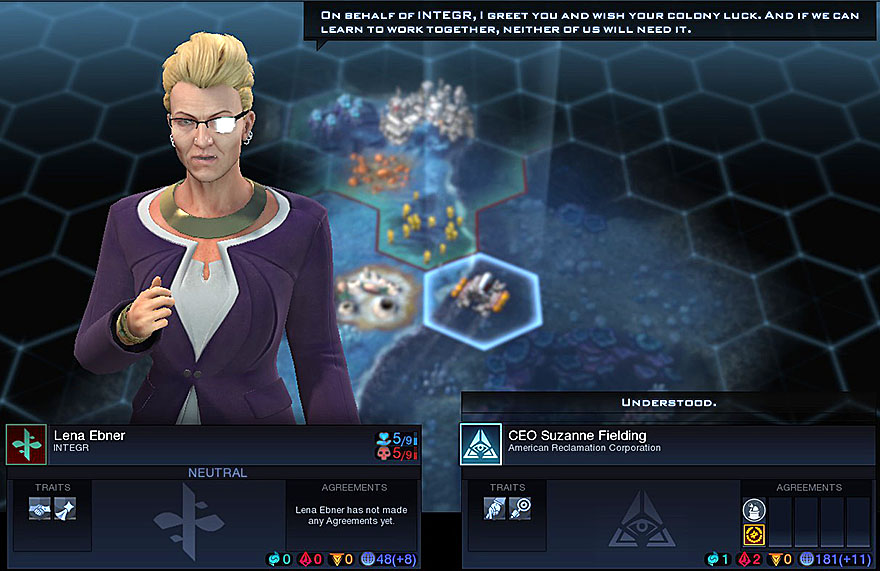 The two women laughed to the point of tears. Élodie and Lena, together again, neighbors for the rest of their lives. It was cosmic irony. It was absolutely delicious. Élodie and Lena Ebner hate each other. If you’re playing one, and encounter the other, get ready for a banquet of passive aggression in unique dialogue. Phan said her goodbyes, then traveled through Central’s concourse to pick up her son. She saw the spiderwebbed impact marks on the glass to the medical center’s door, and her heart turned into a brick. She threw open the door and found Phan Tin, his little face smudged with tear streaks, hands bloodied. The doctors looked up to her with pinched faces. One doctor, his mentor, sported a hand wrapped in blood-stained gauze. 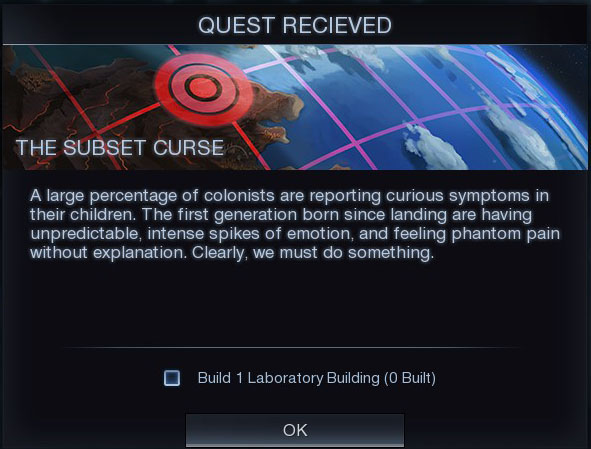 In the weeks to come, Phan came to understand she was not alone. A handful of parents had reported savage mood swings and bouts of inexplicable pain in children of a certain age. Phan made sure to delete emails between parents with children stricken with the syndrome. ARC’s colony was too small to lose everything to panic. Phan confessed her own terror to Fielding. Was there some overlooked element of Tau Ceti E that rejected humanity? Were they doomed to grow old and die on a frigid exoplanet, their offspring incurably unstable? “We’ll make this a priority, Phuong,” Fielding had said, putting her hand on Phan’s shoulder. “I promise you that.” --- Gunfire alerted Axiom’s scientists to their new neighbors. 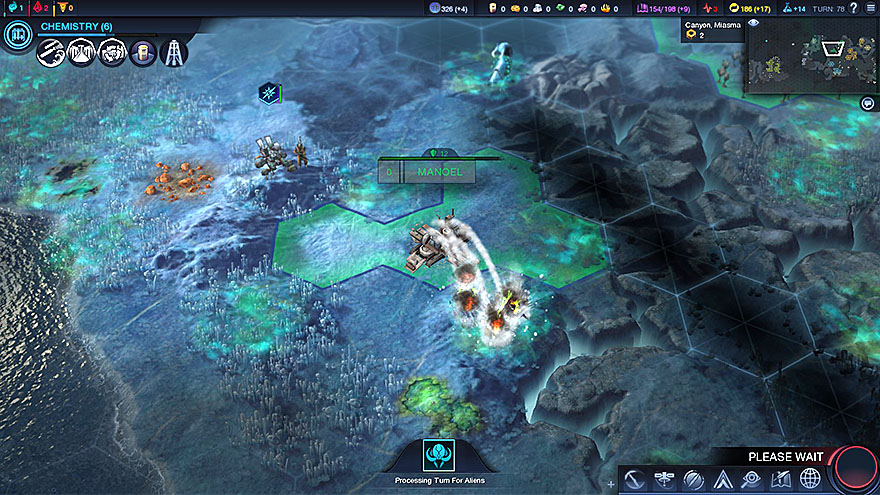 They trained telescopes on Brasilia’s settlement, recording their engagement with one of the wolf beetle swarms endemic to the region. Rejinaldo de Alencar’s men and women held the aliens at bay and shredded them with ripsaw bursts of munitions from behind sandbags and steel palisades. Brasilia was expanding, and the people of Manoel would not be driven away. --- “Rejinaldo is crowding us off the continent,” Fielding said at another meeting with Phan. “He and Vadim are backing us into a corner. We don’t have enough guns to discourage them.” “Would it really come to that?” Phan said. “Would you start the first war on the soil of an exoplanet?” Fielding paused. “We can’t,” she said. “Can’t, or won’t?” Phan said. “Point blank, Ms. Fielding, are we going to go down the road to a second Great Mistake?” “Don’t be dramatic, Phuong,” Fielding said. “It’s academic. A territory war with Brasilia doesn’t play to our strengths.” The two stared at each other in heavy silence, each evaluating the other. Fielding, once the most powerful woman in the most powerful corporation on Old Earth, blew out a sigh. “They’re driving us into the sea,” Fielding said. Phan blinked. “So… let’s go there.” “What?” “Can we build an ARK?” Phan said. “Like Duncan Hughes.” Fielding recoiled. “That is a clear admission of defeat. The NSA built floating cities because they had nowhere else to go. America never needed to build ARKs.” “Think about it, Ms. Fielding,” Phan said. “A naval outpost would put the southern sea into play. We still have room to grow.” “I love your passion,” Fielding said, “but it’s a terrible idea. It’s a bad look for us, full stop.” --- Phan laid in her bed. She stared at her meeting calendar. She thought about her son. The screen cast her face in pale blue light. A notification popped into view. A message from CEO Fielding. “I changed my mind,” it read. --- They had the technology. Until now, no Americans ever needed to make use of it. They just crowded inland. But there was a first time for everything. The colonists sailed south until they found whorls of soupy xenomass churning in the sea. They withdrew to a safe distance and built. 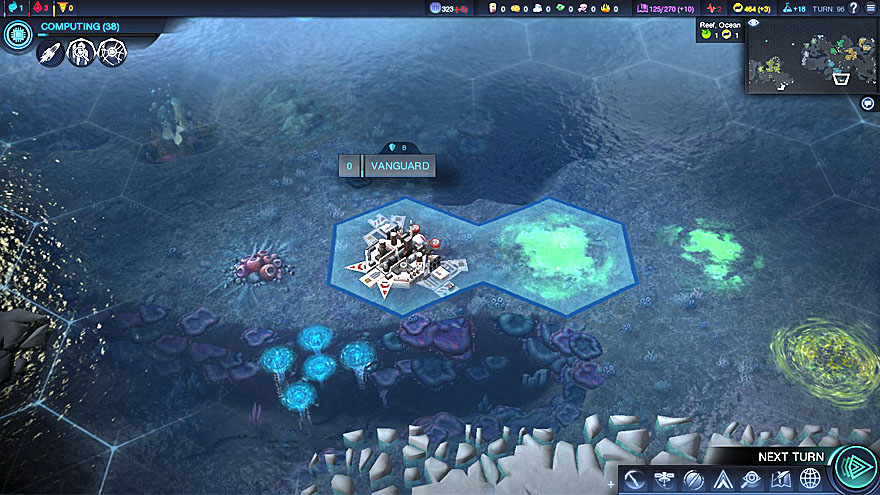 Out on the open sea, there was still a chance for ARC to expand without antagonizing their well-armed neighbors. The settlers of Vanguard believed this, even as Fielding opened another priority communication from the Slavic Federation. 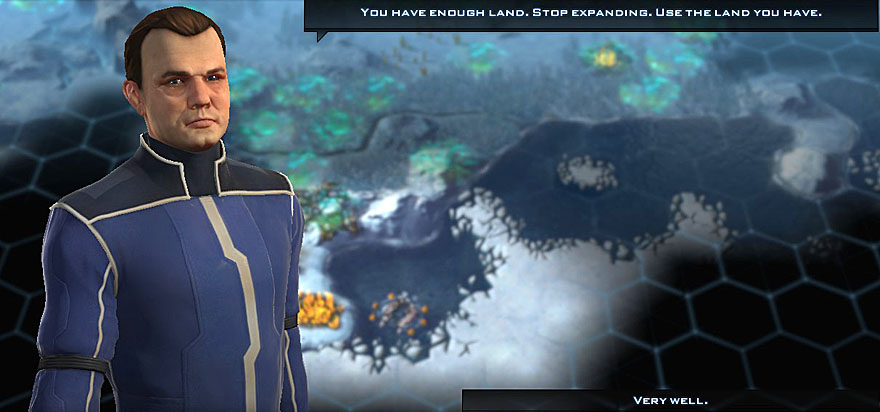
|
|
|
|
Did the Americas get absolutely hosed to pieces during the Great Mistake? Europe was mentioned as taking in a lot of refugees from the Americas in one of the linked articles, and ARC's full name is a bit ominous.
|
|
|
|
Pittsburgh Lambic posted:Did the Americas get absolutely hosed to pieces during the Great Mistake? Europe was mentioned as taking in a lot of refugees from the Americas in one of the linked articles, and ARC's full name is a bit ominous. The game is deliberately vague about the Great Mistake. At (I think) the first Firaxicon the devs left the specifics up to the player, but suggested a nuclear exchange in Asia would fulfill the conditions of radical climate change, mass migrations and strife. North America seems to have gotten wrecked by climate change and environmental damage, and ARC made mitigation of that damage its wheelhouse. South America saw heavy flooding of the Amazon basin, but the game's fiction says its manufacturing base survived enough so that the powers there could sell their services and eventually project their military force out as globocops. The devs admitted that probably the biggest reach of the reordering of political boundaries was that India and Pakistan would set aside their differences to become part of the Kavithan Protectorate.
|
|
|
|
Snollygoster posted:The devs admitted that probably the biggest reach of the reordering of political boundaries was that India and Pakistan would set aside their differences to become part of the Kavithan Protectorate. Well, that's specifically due to the Kavithan religion. Kavitha's father started a massive and extremely popular religious movement that reunited the region through a common religious identity - the details of the religion are deliberately left ambiguous, and in Rising Tide Kavitha can be kind of hilarious when she talks to you.
|
|
|
|
I'd love to know what the mechanics are for when the AI sends you messages like that. How does the AI determine what they consider "their land" vs "your land" before you start getting negatives like "they covet your territory" and such?
|
|
|
|
RedMagus posted:I'd love to know what the mechanics are for when the AI sends you messages like that. How does the AI determine what they consider "their land" vs "your land" before you start getting negatives like "they covet your territory" and such? It depends on the individual AI. As a general rule, if it exists some AI wants it and Kozlov is especially greedy for more land. So is Fielding as an AI. 
|
|
|
|
RedMagus posted:I'd love to know what the mechanics are for when the AI sends you messages like that. How does the AI determine what they consider "their land" vs "your land" before you start getting negatives like "they covet your territory" and such? The higher level of difficulty you choose, the more covetous your neighbors become. I thought I could get away with an offshore expansion but like Cythereal said, Kozlov can be a prick. You have to watch out for Hutama too. He'll call you out, then keep feeding you compliments and deal offers, and suddenly he rolls up on you with a doom stack and declares war.
|
|
|
|
This game is very pretty. Reminds me in ways of Anno 2070. Bookmarked to follow along. Keep going! 
|
|
|
|
Snollygoster posted:The game is deliberately vague about the Great Mistake. At (I think) the first Firaxicon the devs left the specifics up to the player, but suggested a nuclear exchange in Asia would fulfill the conditions of radical climate change, mass migrations and strife. North America seems to have gotten wrecked by climate change and environmental damage, and ARC made mitigation of that damage its wheelhouse. South America saw heavy flooding of the Amazon basin, but the game's fiction says its manufacturing base survived enough so that the powers there could sell their services and eventually project their military force out as globocops. Ended up doing a little poking around myself, too. You're right that the game never says specifically what the Great Mistake was, but it leaves its breadcrumbs about where it happened and the scope of its impact. From the looks of things, it occurred in Central Asia, and the entire region degenerated into a shitstorm of civil wars and nation-states clawing at each other's throats until Brasilia stepped in and forcibly restored order. The mass migrations of refugees from ravaged parts of Asia principally affected Europe, sparking a cascade of crises that culminated with the EU dissolving as every nation tried to find its own solution to the refugee issue and the rising sea levels, which were wreaking havoc all across the globe. What I can tell of what happened with the Americas is that while they were on the opposite side of the Great Mistake, they were still devastated by climate change; the United States in particular saw its agricultural sector disintegrate from droughts and flooding and huge swaths of the southern coast were lost to the sea. The United States government had a massive undertaking called the the Trans-Mississippi Reclamation Project, which was going pretty poorly to the point that the government threw up its hands, gave up on the project, and dropped it into the lap of some engineering and climate mitigation firm called ARC. ARC turned out to be up to the task, managing to succeed in saving the region, and expanded its reach to more and more reclamation projects while at the same time expanding into literally every other area of the private sector, to the point that they employ 23% of the United States. The Civilopedia is really very optimistic about what every sponsor did to put the world back together in the wake of the Great Mistake, though it does make it sound like all the efforts wound up being for naught in the face of the Commission Report on the Inflection Point, which was basically wearefucked.pdf and threw every nation into scramble mode to get their seedships into the sky before it was too late.
|
|
|
|
Do remember that America technically refers to both North and South America, not just the United States: even a small number of immigrants from each part of the Americas could become a massive number, considering the land mass adds up to 42,068,068 square kilometers, or 16,242,497 square miles. By contrast, Asia is 44,391,162 square kilometers, or 17,139,445 square miles. Throw is massive climate shifts, and we can see things like upper Canada becoming more livable, or the US West Coast becoming a desert due to lack of rain, and the continental land masses could easily be functionally equal in their ability to support a population. For the sake of visualization:  So basically, assume that "immigrants from America" is about as vague in this game as "immigrants from Asia" is in real life, as both landmasses are so big and contain so many cultures and economic strata that "immigrants" could refer to almost anything: highly skilled workers fleeing corruption, extremely corrupt officials/businesses fleeing the results of their actions, or beggars with absolutely nothing of value trying their luck elsewhere. So take your pick, I guess?
|
|
|
|
Pittsburgh Lambic posted:The Civilopedia is really very optimistic about what every sponsor did to put the world back together in the wake of the Great Mistake, though it does make it sound like all the efforts wound up being for naught in the face of the Commission Report on the Inflection Point, which was basically wearefucked.pdf and threw every nation into scramble mode to get their seedships into the sky before it was too late. This is one of the fundamental premeses behind Beyond Earth: that a lot of awful poo poo happens but humanity ends up prevailing. Conflict comes from differing visions of utopia and different answers to what it means to be human. Even the Inflection Point ends up being off: the new Rising Tide factions of INTEGR, Chungsu, the North Sea Alliance, and Al Falah launched later than the original eight. Later, in fact, than the first-wave Seedings believed would be possible. You can see their response in the Rising Tide intro video: the first wave's response to a new Seeding wave isn't hostility or suspicion, but launching fireworks. And then the Purity and Supremacy folks go back and save the people of Earth to boot.
|
|
|
|
Pittsburgh Lambic posted:The Civilopedia is really very optimistic about what every sponsor did to put the world back together in the wake of the Great Mistake, though it does make it sound like all the efforts wound up being for naught in the face of the Commission Report on the Inflection Point, which was basically wearefucked.pdf and threw every nation into scramble mode to get their seedships into the sky before it was too late. As Cythereal says, the game has an optimistic tone, and that even comes across in wearefucked.pdf. In Alpha Centauri, you aren't even sure humanity on Earth survives long enough for the Unity to reach Alpha Centauri, much less long enough for them to tech up to being able to go back. In Beyond Earth, by contrast, the Inflection Point isn't 'the end of humanity' or even 'society collapses'. It's 'we can no longer afford to leave Earth'. And conditions on Earth are bad when the Purity/Supremacy victory happens, but not 'subsistence farming' or 'eating our young' or anything. It's entirely possible that, even without the intervention of the colonists, Earth society would recover, or at least stabilize. They're just helping it along.
|
|
|
|
FredMSloniker posted:As Cythereal says, the game has an optimistic tone, and that even comes across in wearefucked.pdf. In Alpha Centauri, you aren't even sure humanity on Earth survives long enough for the Unity to reach Alpha Centauri, much less long enough for them to tech up to being able to go back. In Beyond Earth, by contrast, the Inflection Point isn't 'the end of humanity' or even 'society collapses'. It's 'we can no longer afford to leave Earth'. And conditions on Earth are bad when the Purity/Supremacy victory happens, but not 'subsistence farming' or 'eating our young' or anything. It's entirely possible that, even without the intervention of the colonists, Earth society would recover, or at least stabilize. They're just helping it along. Someone do a companion LP to this and play Fate of the World on the "survive 200 years" difficulty to see how Earth does without us. Energy scarcity and the end of petrochemicals are going to be a bitch. We're stuck with renewables. Silicon Valley and the aviation industry probably can't run on sunlight alone. I don't know enough about the agriculture industry to do back-of-the-envelope math on how much oil it consumes, but I bet it takes a hit, too. We'll survive, but there will be war and famine, to say nothing of what Earth's weather patterns will be like with an atmosphere warm enough to raise the sea level several meters. I figure after a few centuries of this, Earth would greet even Supremacy invaders like this: https://www.youtube.com/watch?v=rYE84KgOPXY
|
|
|
|
FredMSloniker posted:As Cythereal says, the game has an optimistic tone, and that even comes across in wearefucked.pdf. In Alpha Centauri, you aren't even sure humanity on Earth survives long enough for the Unity to reach Alpha Centauri, much less long enough for them to tech up to being able to go back. In Beyond Earth, by contrast, the Inflection Point isn't 'the end of humanity' or even 'society collapses'. It's 'we can no longer afford to leave Earth'. And conditions on Earth are bad when the Purity/Supremacy victory happens, but not 'subsistence farming' or 'eating our young' or anything. It's entirely possible that, even without the intervention of the colonists, Earth society would recover, or at least stabilize. They're just helping it along. The Journey to Centauri serial that Firaxis posted in the lead-up to the release of Alpha Centauri made it pretty unambiguously clear that by the time the crew of the Unity even came out of cryo there wasn't an Earth to go back to. Every computer system they tried to contact back on Earth was either offline or spewing error messages, and there was a lot of talk about just how amazingly lovely things had been on Earth during the last days before launch. Pretty much every stage of the Unity's construction was completed by a different regime, because governments weren't cooperating with each other nor holding together long enough to get anything constructive done; one consequence of this was that the Unity's systems were unreliable and prone to catastrophic failures, such as a lot of people in cryo dying along the way. Civ: Beyond Earth is trying to tell a very different story; whether it's more compelling than the one told by Alpha Centauri I'm not certain. Really liking the narrative this LP has put together, though.
|
|
|
|
Snollygoster posted:Someone do a companion LP to this and play Fate of the World on the "survive 200 years" difficulty to see how Earth does without us. It's doubtful that petrochemicals would outright 'end', as both deep-sea extraction and the creation of artificial oils could still solve the worst of the problems caused by a loss of cheap oil (like losing the ability to manufacture plastics and chemicals). Recycling previously discarded plastics would also become more viable, creating an upside to its long-rear end decay time. For energy, nuclear power will still be viable long after oil is exhausted, especially if used in conjunction with renewables. Transportation could be solved by batteries: we already have electric cars, and ships can use batteries for shorter journeys or nuclear power for longer ones, while aircraft powered by batteries can still do both agricultural work and transport mail. For longer travel, returning to airships is still be possible, and presumably much faster than the airships of old (albeit still slower than what is used today), and the use of ships never actually stopped. Also, famine isn't actually a problem in itself so much as a problem created by poor governance: the famine-struck regions that exist today owe their existence to corruption and incompetence, both of which require the rest of the world to be complicit in order to continue. Ending world hunger may be as easy as blockading the major cities of the most destitute third world countries: how long would assholes like Mugabe manage to keep power once the beneficiaries of his corruption get reduced to the same sorry state their victims exist in? I'd give the administration several months before they would be willing to throw Mugabe out and conceded the mis-managed farmland to people who actually know what the hell their doing. So basically, most people's standard of living would go down, but life would otherwise remain similar as to what it is now.
|
|
|
|
thetruegentleman posted:Ending world hunger may be as easy as blockading the major cities of the most destitute third world countries: how long would assholes like Mugabe manage to keep power once the beneficiaries of his corruption get reduced to the same sorry state their victims exist in? I'd give the administration several months before they would be willing to throw Mugabe out and conceded the mis-managed farmland to people who actually know what the hell their doing.  Dude, er, do you seriously believe this?
|
|
|
|
The Inflection Point is also clearly stated to not be "the end of mankind," it's "the end of civilization at its current level," particularly regarding space flight.
|
|
|
|
thetruegentleman posted:Also, famine isn't actually a problem in itself so much as a problem created by poor governance: the famine-struck regions that exist today owe their existence to corruption and incompetence, both of which require the rest of the world to be complicit in order to continue. Ending world hunger may be as easy as blockading the major cities of the most destitute third world countries: how long would assholes like Mugabe manage to keep power once the beneficiaries of his corruption get reduced to the same sorry state their victims exist in? I'd give the administration several months before they would be willing to throw Mugabe out and conceded the mis-managed farmland to people who actually know what the hell their doing. No, dude. Famine is not caused by poor governance even in the example you used; the droughts that followed the expropriation as well as the turn to cash crops had a far greater influence than ~those poor whites~ having their land confiscated. jesus loving christ
|
|
|
|
thetruegentleman posted:...the creation of artificial oils could still solve the worst of the problems... I'm sorry?
|
|
|
|
It's actually kind of refreshing to see a post be so complete and utterly wrong about everything.
|
|
|
|
Samovar posted:I'm sorry? http://www.sciencedaily.com/releases/2013/04/130422154911.htm http://arpa-e.energy.gov/?q=slick-sheet-project/natural-oil-production-microorganisms Long story short it's definitely a thing that's being looked into.
|
|
|
|
Deceitful Penguin posted:
Jesus loving christ indeed. Droughts are problem, but not an insurmountable one: people can be relocated, food can be imported, agricultural equipment and chemicals can be bought to maximize output in non-drought struck areas, etc. Droughts ARE insurmountable when soldiers are standing at the border to interdict the region, preventing aid from entering or people from leaving, and when soldiers displace the people actually growing food that could be used in famine struck areas to barren land, which is what actually happened in Zimbabwe. Here, read some (summarized) material from Physicians for Human Rights, to see that I'm not pulling this out of my rear end: -- "The U.N. Food and Agricultural Organization (FAO) predicts that some 5.1 million (45% of the population) who will require food aid by early 2009 in order to survive. Agricultural output has dropped 50-70% over the past seven years. The ZANU-PF government has exacerbated food insecurity for Zimbabweans in 2008 by blocking international humanitarian organizations from delivering food aid and humanitarian aid to populations in the worst-affected rural areas. Patients with HIV/AIDS and TB are especially vulnerable to food insecurity." Recommendations: "1. Resolve the political impasse The UN Security Council and the South African Development Community should call on the Mugabe regime to accept the result of the 29 March election and allow the MDC to assume its place. Governments should end their support of Mugabe’s regime, engaging in intensive diplomacy to assure a democratic political transition. They should maintain and strengthen targeted bilateral sanctions until Mugabe leaves power and a stable government is established. 2. Launch an emergency health response The government of Zimbabwe should yield control of its health services, water supply, sanitation, disease surveillance, Ministry of Health operations, and other public health functions to a United Nations-designated agency or consortium. Such a mechanism would be equivalent to putting the health system into a receivership pursuant to the existence of a circumstance that meets the criteria for the Responsibility to Protect. If the government of Zimbabwe refuses to yield such control, the U.N. Security Council, acting pursuant to its authority under Article 39 of the Charter, should enact a resolution compelling the Government of Zimbabwe to do so." The Drought: Mugabe ordered a special army brigade into Matabeleland to stamp out the anti-government violence. The Fifth Brigade was made up of virtually all Shona troops, and it had received special training from North Korean advisers. The Fifth Brigade swept across Matabeleland throughout 1983 and 1984 carrying out a series of mass beatings, torture, and killings, according to numerous witnesses. The army also set up road blocks, which prevented food supplies from going into the Matabeleland region where there was drought and where widespread hunger was reported. In 1987, Mugabe succeeded in getting Nkomo to merge his smaller party, ZANU, into Mugabe’s ZANU-PF. The army’s violence in Matabeleland halted; but the government continued to restrict spending on health, education and infrastructure in the region. Evictions: In June 2005, Mugabe’s government destroyed the homes and businesses of urban populations suspected of supporting the opposition MDC. The urban townships in Harare, Bulawayo and other major cities had voted overwhelmingly against Mugabe and for the MDC. In retaliation, Mugabe launched Operation Murambatsvina – Shona for “clean out the filth” – in which the army and police destroyed thousands of MDC-supporter homes in the urban townships. The destruction was on such a massive scale that the United Nations sent a delegation to Zimbabwe to investigate. The U.N. Special Envoy reported that 700,000 homes and small businesses were destroyed, affecting an estimated 2.4 million people. Thousands of these newly homeless people were trucked into rural areas (like Matabeleland) by the Government and told to settle there, without benefit of food or supplies. Once again large groups of people huddled alongside roads. Public health experts expressed concern that the newly homeless population suffered high levels of malnutrition, disease and, as a result, lower life expectancy. Economic collapse: "A causal chain runs from Mugabe’s disastrous economic policies, to Zimbabwe’s economic collapse, to food insecurity and malnutrition, to the destruction of public healthcare, and finally to the current outbreaks of infectious diseases. These policies include the land seizure of 2000, a failed monetary policy and currency devaluations, and a cap on bank withdrawals. These policies have led to displaced farmers, low salaries and unemployment, hyperinflation, dollarization of the economy – all of which have led to food insecurity and malnutrition that have aggravated the recent outbreaks in disease and drastic declines in leading health indicators." Displacement of Farm Workers: "During the land seizures which began in March, 2000, more than 4,000 white-owned farms were taken over by Mugabe’s supporters. Twelve white farmers were killed during the land seizures. The workers on those farms were also targeted for abuse because they were identified as supporting the opposition. There were more than 300,000 farm laborers on the white-owned farms, comprising the largest group of employees in the country. With their families the farm-workers were more than one million people. The vast majority of these farm-workers were thrown out of their homes and off the farms. Many suffered violence and loss of property. For months large groups of these displaced workers were seen camping alongside roads. Public health experts estimated that this large group of people suffered serious health problems." Drought: Poor harvests during the past three years due to droughts and erratic rainfall – especially in marginal agro-ecological zones – exacerbate the government-induced unavailability of basic agricultural inputs(or farmers unable to afford such inputs). PHR investigators interviewed several rural subsistence farmers who reported that over the past three years they have experienced severe food shortages. On random inspection of a few grain silos in one area that is prone to food insecurity in times of drought, PHR confirmed that they had exhausted their meager stocks of maize, which would normally supply them during the lean months of the growing season (December through March) before the next 2009 spring harvest. Most families whom PHR interviewed survive on less than one meal per day, and a senior Ministry of Health official confirmed this deplorable statistic adding that the food situation is very pathetic and quite bad in Zimbabwe. In fact the United Nations estimates that two-thirds of Zimbabweans currently subsist on one meal a day and that 56% of all Zimbabweans live on less than $1 USD per day. -- There so many problems with the country that you all should really read the whole thing at: http://physiciansforhumanrights.org/library/, and another source discussing the relation between famine and war can be found here: http://www.worldhunger.org/articles/fall2000/messer3.htm. Suffice to say, people don't just lay down and die when encountering hardship, and there's presently no real shortage of people with the means to help famine struck areas, if they're allowed to do their job. Rather, the problems arise when instead when people are forced to die because others forcibly prevent positive change from being enacted.
|
|
|
|
Global ecological collapse does not work that way. This is you, thetruegentleman: http://i.imgur.com/Vibr32S.gifv
|
|
|
|
What is it about Firaxis Game LPs that bring out the loons?
|
|
|
|
Nah, it's just a loony LP year. We had a true whackadoodle in Grey's LP.
|
|
|
|
|
Cythereal posted:Global ecological collapse does not work that way. I can't tell if I'm being trolled or not, so I guess I'll just concede the point: politics has no noticeable effect on ecology or agricultural, and the effects of environmental disasters can never be effectively mitigated.
|
|
|
|
Talking about the 2009 situation is simultaneously way in the loving past and not really long term enough considering the reason there was a famine to begin with was the worsening conditions for agriculture in general, while the situation today has changed dramatically from 7 goddamn years ago. It also completely misses the greater point of increased food insecurity only becoming a more serious problem even as ever more marginal land is used for agricultural purposes, especially with the out-right land grabs from Chinese agricorps has caused several serious situations in Mozambique and other parts of Southern Africa. Robindaybird posted:What is it about Firaxis Game LPs that bring out the loons?
|
|
|
|
This talk about AIs noticing what you do makes me wonder if there's like, someone who claims land but not water or vice versa, or if the acquisitive people just have a cap circle.
|
|
|
|
Glazius posted:This talk about AIs noticing what you do makes me wonder if there's like, someone who claims land but not water or vice versa, or if the acquisitive people just have a cap circle. One of the new factions starts in the sea, and his bonus makes aquatic cities better in some way. I have to assume as an AI he'll be all about building sea cities
|
|
|
|
Polaron posted:http://www.sciencedaily.com/releases/2013/04/130422154911.htm I didn't think it wasn't being looked into, I was just very disinclined to think artificial oils were anywhere near applicable at this time.
|
|
|
|
Snollygoster posted:Someone do a companion LP to this and play Fate of the World on the "survive 200 years" difficulty to see how Earth does without us. Also, yours here is looking great! I'm always glad to see the Beyond Earth love spreading, and the narrative format is my favorite kind of Let's Play. 
|
|
|
|
Part 8: An Exciting New Career Opportunity “I think,” Phan Phuong said to her boss, “you didn’t take into account a need for diversity when you staffed the seedship.” Suzanne Fielding leaned forward in her chair, narrowing her eyes. Her longcase clock ticked out the seconds. “Excuse you?” Fielding said. “I’m not talking about ethnic diversity,” Phan said. “But the committees who picked us were ableist. You picked people without physical or mental disability, as though we could leave those things behind on Old Earth.” She couldn’t keep a note of accusation out of her voice. “We’re starting a new colony on an exoplanet, Phuong,” Fielding said. “Why would I staff a seedship with people who can’t pull their weight?” “Because none of us are going to be healthy forever, Ms. Fielding. I’ve heard a miner can’t walk after an accident at the quarry. Did you know Central isn’t handicap-accessible?” “That’s-” Fielding opened her mouth, then closed it. She hissed a sigh through her nose. “You’re upset about your son, aren’t you,” she said. Phan pinched the bridge of her nose. “I’m… not going to blame you. But I am upset. He wanted to be a doctor so badly. Now they just run tests on him and the others with… whatever it is.” --- Weeks later, Phan and Fielding found out what “it” was. 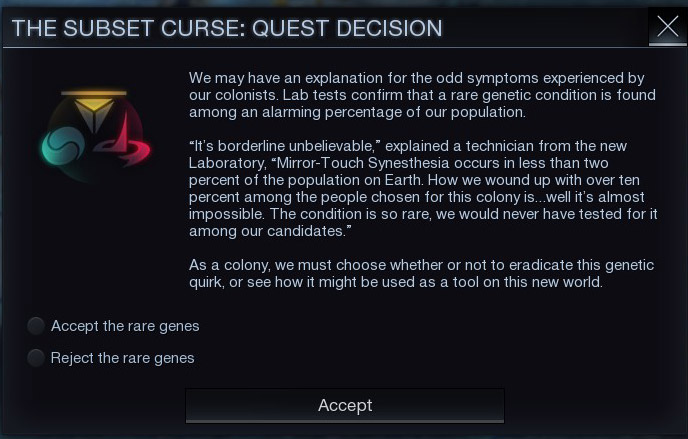 At last, the monster had a name and an explanation. Phan and her son read all they could about mirror-touch synesthesia. Central’s medical team told the CEO they might be able to suppress the gene in future generations. Fielding considered this. She made sure word of the meeting did not reach Phan. 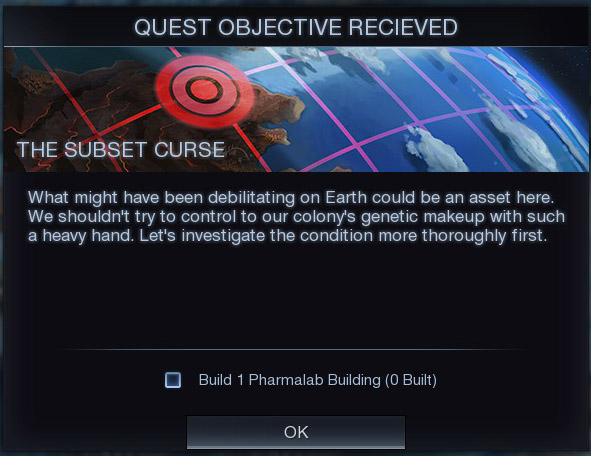 --- Phan Tin took to shadowing ARC’s astronomers and their Slavic Federation consultants. He didn’t want to be an astronomer. Thanks to a battery of antidepressants and sedatives, he didn’t want to do much of anything at all. He watched them take stock of the Tau Ceti system. The going was slow, as they had nothing like the infrastructure they needed to catalogue their celestial neighbors with the exhaustive completeness they took for granted on Old Earth. They let Tin adjust and observe a small orrery. “It doesn’t have any sharp edges,” they said, when they thought he couldn’t hear. Tin heard a lot. He could speak four languages, though he did not have much cause to practice his Vietnamese outside of his family. He heard the Federation scientists joke about the bodged-together ancillary crap on ARC’s solar collector satellite. The patent inferiority of ARC’s orbital resources amused them. Tin heard the friendly rivalry turn sour when the satellite’s orbit began to decay. The ARC team said they got bad advice from the Federation observers. The Federation team said ARC should obviously go to Lena Ebner and beg INTEGR for a second solar collector, since they happened on the first one only by pure, poo poo-assed luck. The satellite drifted out of position in a matter of weeks. The loss of energy threw off ARC’s financials by hundreds of thousands of kilowatt-hour dollars. Fielding wanted to know why. Tin, teenaged and gangly, all elbows, hugged his elbows to his chest in a corner while budget analysts, scientists, and Slavic Federation observers shouted at each other in English, Spanish and Russian. He felt their anger spin through the room like a curse on a prayer wheel. It spun through him “Stop it,” he said. “Stop it!” They didn’t hear him, and took no notice of him until he had picked up the orrery and smashed it against a wall. Tin didn’t want to be an astronomer anyway. --- The inhabitants of Vanguard Outpost felt vulnerable in a way they had not since the very first days after planetfall. The alien ground under Central was still, in the end, ground. What if a massive storm capsized the outpost? What if some pelagic monster mistook the outpost’s shadow for prey? What if there was a second Makara? What if there was something worse than Makara? The presence of cutter ships from Central comforted them. The ships’ marines hunted the rippers around Vanguard, first for survival, then for food and sport. They argued endlessly with ARC’s xenobiologists over whether or not they should destroy the rippers’ nesting grounds. 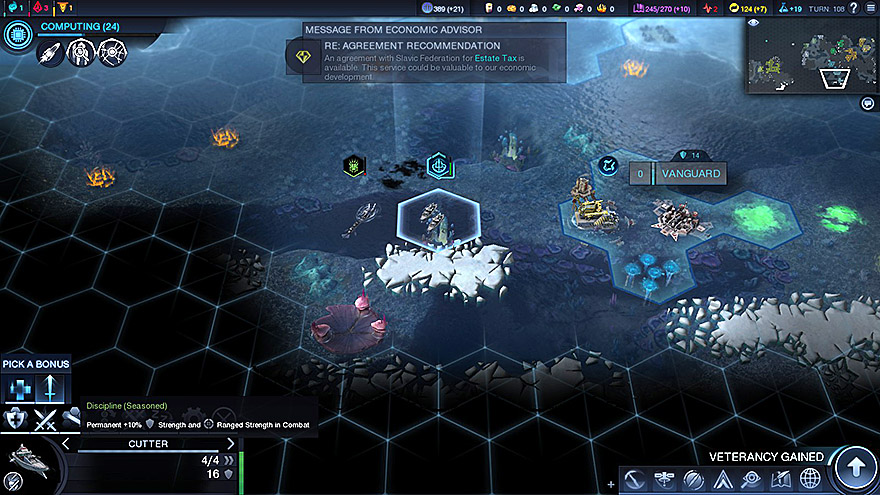 Water cities do not generate as much negative health as land cities, and generate more culture points. However, they have low hit points relative to land cities and can be more expensive to defend. They do not “naturally” claim a spread of tiles around the city like their counterparts on the land. You can do this by setting a production order to “move” the city in a direction. When the city moves, it paints the tiles adjacent to its new position. IMO it’s easier in mid- to late-game to just buy tiles outright with banked energy. More of ARC’s industrial resources poured into defense forces. In the years following the Makara incident, many in the corporation wanted to hunt aliens. Even a few of ARC’s second generation, old enough to remember Makara, wanted to keep their parents and neighbors safe from monsters. No one dared to breathe the idea of turning their rifles and rockets against human targets. Phan forbade her son outright from joining ARC’s defense force. Not that the defense committee would have him, or any of the other children and teens burdened with mirror-touch synesthesia. Tin spent joyless months with fungus and tuber farmers, far away from heavy machinery. His mother spent joyless months conferring with CEO Fielding over the messages they received from the leaders of other colonies.    Often, the first diplomatic tipping point comes when your solar collector’s orbit decays. You’re nearly guaranteed a solar collector in a capsule in the early game. The energy production and orbital presence give you a monetary boost as well as a measure of respect in the eyes of people like Vadim Kozlov. The Slavic Federation respects the accumulation of energy and the presence of satellites. We’re short on both now, and Kozlov is already angry with us for making a third settlement. Phan heard a great deal from Vanguard. Thanks to the mines near Central, ARC had finally built its computing infrastructure back to an Old Earth standard. Wireless transmissions threaded between personal computers and mobile devices, between Central, Axiom and Vanguard. After centuries in the void between stars and years of toil and scarcity, ARC reinstated its social network platform. 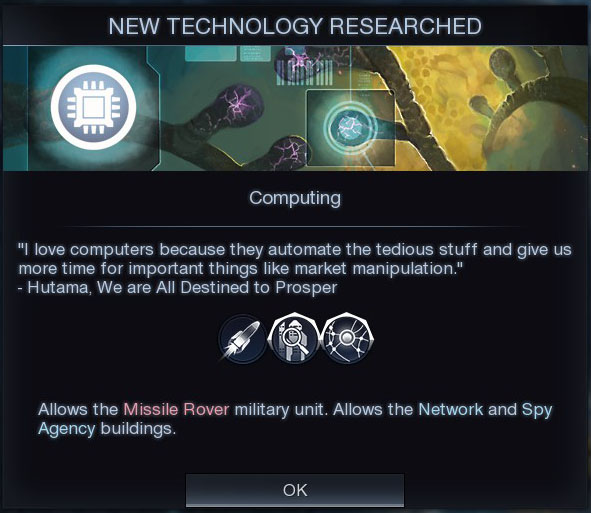 Children cracked jokes about their parents' dependency on social feeds. For the first time in history, parents were social media natives, and their children were not. The first generation sank back into the habit after years of privation. They formed nostalgia groups, shared old photos, started new feuds. Phan bathed in a stream of data in her bed, pillow under her chin, tablet in hand. Her husband had long since fallen asleep. ARC’s financial team accounted for the sick days and injuries in the colonies, but were alarmed to discover they matched and often exceeded the poor health indicators of the worst parts of North America. No one had an easy answer. Maybe it was the shock of life on a new world. It could be trace elements of miasma in the atmosphere, taking its toll in the long run. Scientists checked alien plants and animal meat for microbes and archaean prions they might have otherwise missed. It certainly didn’t help matters that Brasilia had started exporting cigarettes. ARC’s young synesthetes were especially susceptible around smokers. Phan blinked, rubbed her eyes. She heard shuffling footfalls. Tin came into her room, smiling, bleary-eyed. “Mom,” he said. “I want to make a show about ARC’s fungus farmers.” “I’m sorry?” she said. “I’m going to call it ‘Lichen Subscribe.’” “Go to sleep, Tin.” Phan turned to her tablet and made a note to change Tin’s medication. --- The glory of wireless data saturation ignited the social and romantic lives of ARC’s colonists, but failed entirely to curb the proliferation of poor health. Phan was horrified to learn that a few parents of mirror-touch synesthetes had resorted to the pre-Mistake barbarism of crowd-sourcing for treatment funds, cashing in social capital for medical resources. ARC was not thriving, and that was the grim truth. It galled Fielding to no end to call on the Kavithans to help them set up a central health authority. The admission telegraphed the corporation’s failure to keep its employees safe and healthy. It was not on message. But the CEO knew when ARC needed help.  Diplomacy can be a quick bandage for early- and mid-game problems. My deal with Kavitha gets me down to -9 unhealth. Kozlov did not hesitate to decry the American Reclamation Corporation’s basic inhumanity to its constituents. The unassailable multi-national corporation was a mistake of Old Earth. It was fitting, he said, that it should founder on the rocks of a new world. A business cannot govern. A government run like a business is madness. 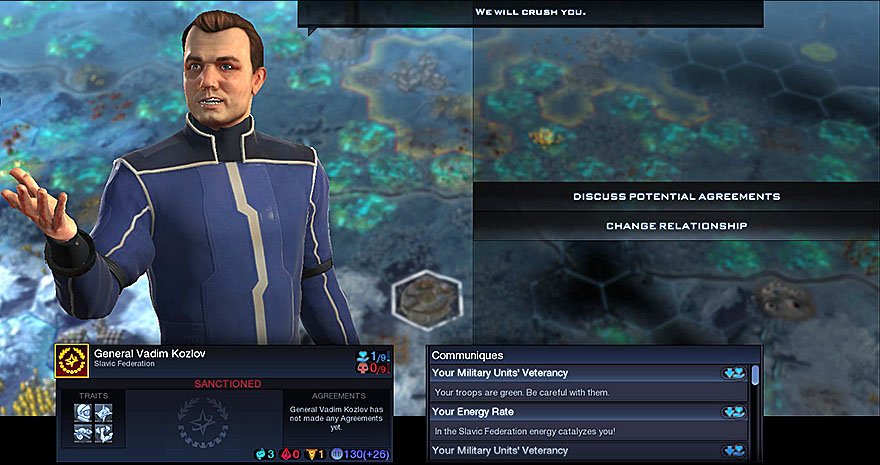 The nascent international community of Tau Ceti E considered Kozlov an elitist crank, but they stopped short of disagreeing with him. Hutama had only praise for Fielding and ARC, but he broadcast images of the Polystralian settlements as lands of green and plenty. While ARC wheezed on its own fumes, the Commonwealth of the Pacific made beautiful things for their own sake.  First wonder goes to Hutama! The Stellar Codex adds +8 to the host city’s orbital coverage radius. Wonders also give you political capital points. It’s a good early-game wonder if you want to play around with satellites, but satellites are honestly icing on the cake in Beyond Earth. More than anything, this shows the head of steam a civilization like Polystralia can build if it’s left alone with most of a continent to stretch its legs. Tin begged to sail off to see the Stellar Codex. His parents refused. Their neighbors heard the screaming match through their hab’s insulated bulkheads. Tin couldn’t work. He sat in his room, scrolling through social media feeds, taking heavier doses of suppressants, submitting to more and more bloodwork. He watched his parents’ marriage fray by degrees. He made friends with the other synesthetes, all of them young and drugged into near-torpor, paralyzed with despair. They needed a reason to live. A week before his 23rd birthday, scientists in Vanguard derived a psychoactive drug from jelly-stalks and canopy worms. The jelly-stalks came from ripper nests, but no one mourned the loss of a spawning ground for aggressive oceanic predators. 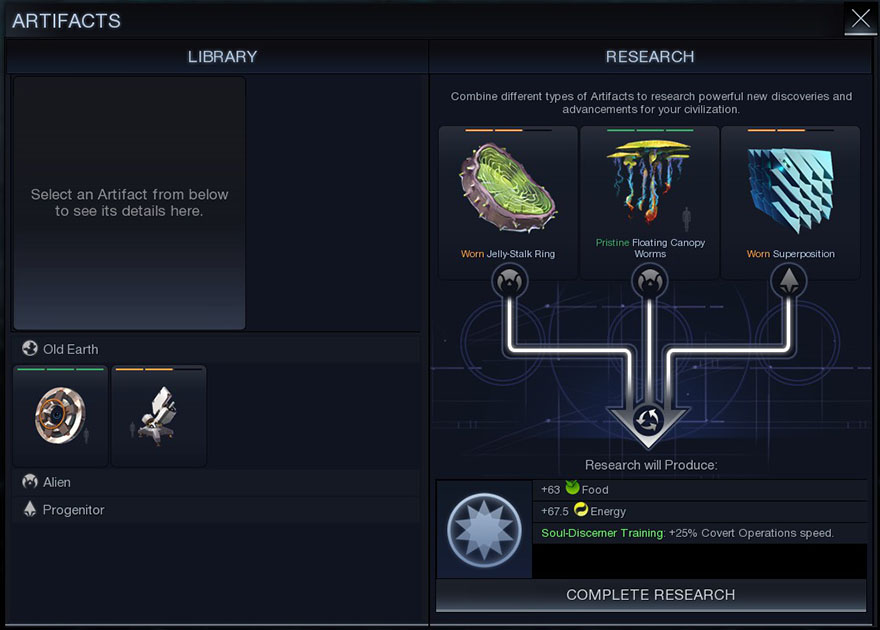 We got another alien artifact from destroying the nest by Vanguard. Let’s mix and match our artifacts and see what we get… what’s this? ARC scientists had labored for years to understand the solidified quantum superpositions Dr. Penny Prickett had pulled from an undersea Progenitor ruin. They had rigged a machine interface to observe the superposition, to no use. The scientists wondered if they might have some greater understanding of the quantum wonder if they were stoned to the gills. They wondered what would happen if a mirror-touch synesthete took the alien-derived drug and studied the superposition. 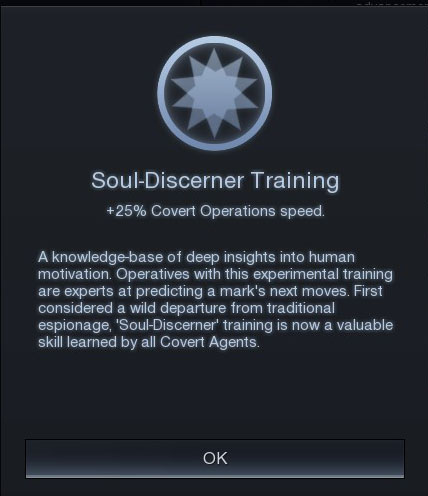 Oh yes. A few months later, a pharmalab in Axiom, working with a team of psychiatric advisers, reached a greater understanding of the mirror-touch syndrome. The gene therapy they developed did not destroy the syndrome. The treatment tempered the way mirror-touch synesthesia expressed itself, changed it somehow. They needed to find how. 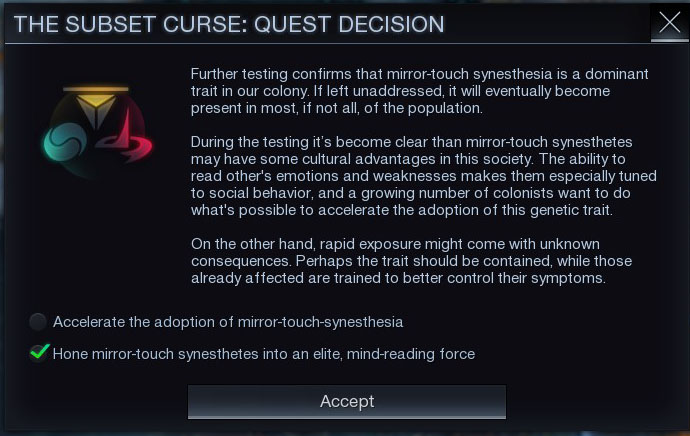 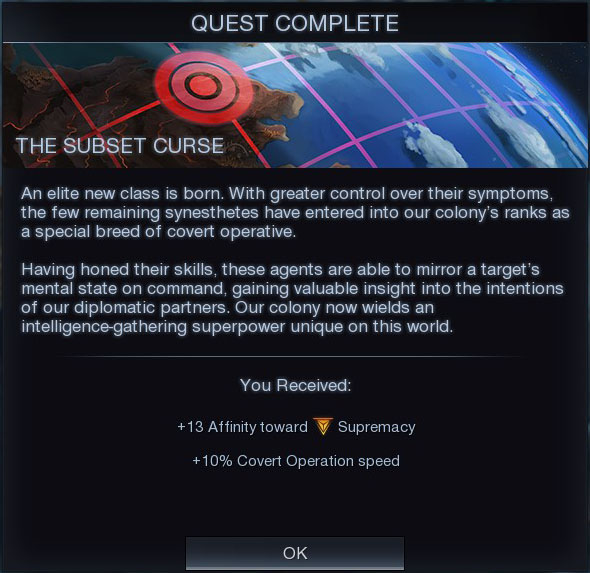 Oh yes indeed. --- Fielding stared at her reflection in the glass of the longcase clock in her office. ARC’s colonies risked their own inflection point, a bending of the curve into illness and political irrelevance. She had spared no expense. She had planned for everything and compensated where she could. ARC was not thriving, not like her neighbors. She needed to know why. She needed to know how the others thrived. 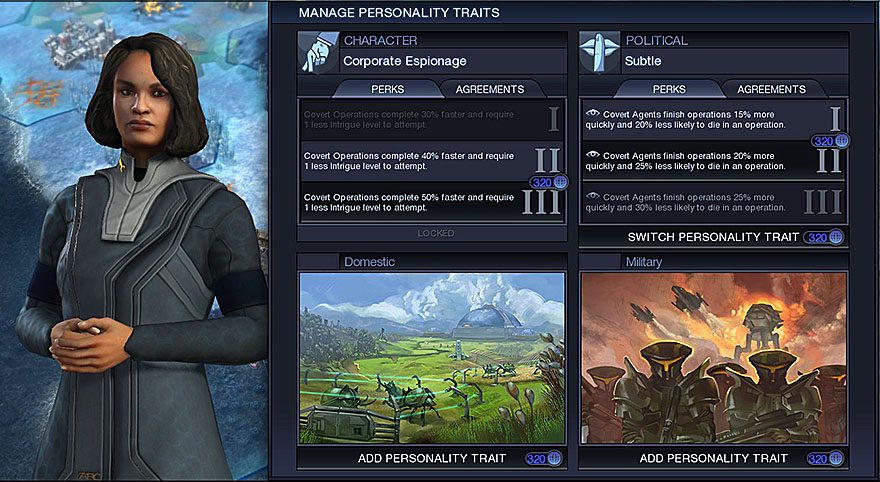 OH YES I’ve sat on my diplomatic capital for a good long time, amassing more than 700 points of it. Here’s why. Remember the political trait that gave me a science bonus for active agreements? I swapped it out with Subtle, giving me +15 percent speed to covert operations and an increased chance of surviving the operations. I juiced up my faction bonus to its second tier, granting me +40 percent speed. This stacks with the bonuses I received from The Subset Curse and Soul-Discerner Training. poo poo is about to get real. --- Tin looked up at the men and women in dark suits who had entered their hab. He saw his mother behind them, over their shoulders, her expression unreadable -- even to him. He could tell something excited the strangers. He felt an echo of their energy under the fog of suppressants. “Tin,” one of the men said, “I believe we have a job you can do.”
|
|
|
|
And thus the shadow wars begin.
|
|
|
|

|
| # ? Apr 25, 2024 09:46 |
|
Who needs to do research or recruitment when you can have other nations do it for you?
|
|
|








